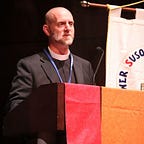Mourning
(The following article originally appeared in the Journal of Lutheran Ethics)
The Need for Mourning
Recently my aunt died, and I traveled to attend her viewing and funeral. Funeral related travel offers a mix of emotions — sadness over the loss of a loved one, fond memories of my aunt from my youth, and genuine gladness over being able to see family that I don’t get to visit with very often due to my living many hours away.
Like most funerals, there is a richness in the rituals and liturgy that acts like a guide for our mourning. There is comfort in the ability to mourn collectively for a time. Showing emotion is socially acceptable and appropriate. Funerals though seem to be the only part of mourning that we have any attachment to in our society. In most cases, the expectation is that loved ones move on quickly from the pain of loss and get back to “normal” as if nothing happened.
As a society, we are terrible at meaningful and intentional mourning. It’s not just society either. I have said many times that the church is really good at funerals but is terrible at mourning. A funeral is an event that encompasses a few days. It gets us started, but funerals were never meant to be the full measure of what is means to mourn. That’s because mourning is much more complex and prolonged than a funeral service. This is true of mourning whether it is for the death of a loved one or for a change in our church.
Mourning could be described as the long, intentional process of acknowledging and embracing…
